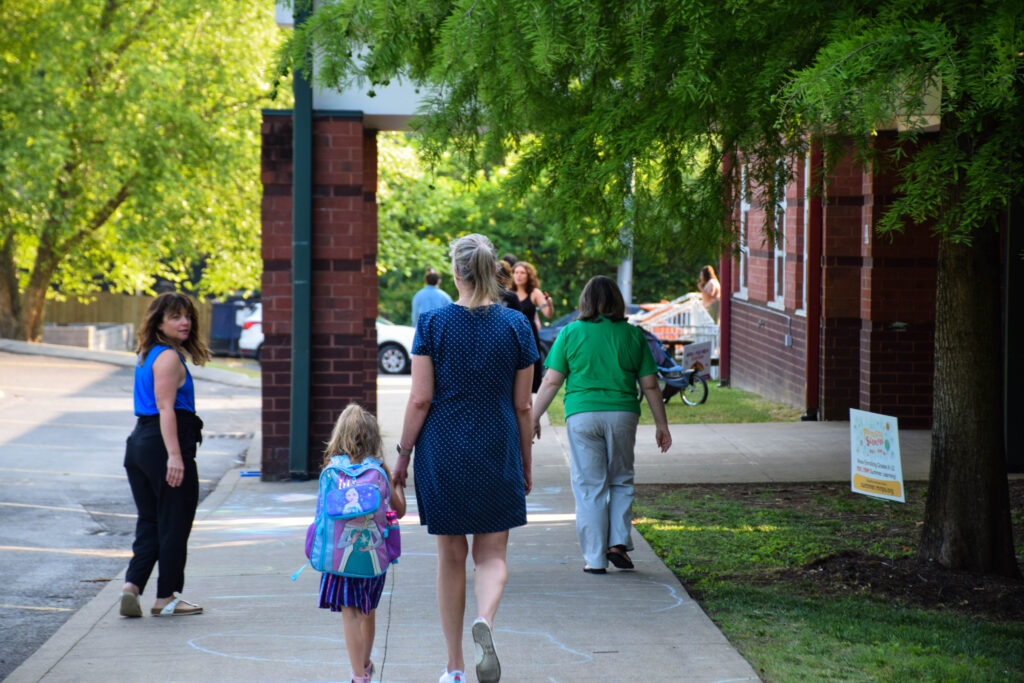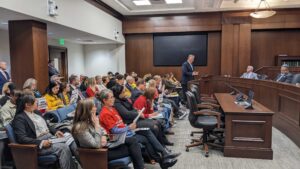
As 2023 comes to close, WPLN is taking a moment to remember some of the biggest stories of the year. In education, big policy changes usually take the number one spot. Unfortunately, this was not a typical year.
On March 27, an assailant entered the Covenant School, a private Christian school in Nashville, and opened fire. The assailant killed three nine-year-old children and three adults working at the school. The children were Evelyn Dieckhaus, William Kinney, and Hallie Scruggs. The adults were Mike Hill, Katherine Koonce and Cynthia Peak.
 Alexis Marshall WPLN News
Alexis Marshall WPLN NewsA memorial has formed at the entrance to Covenant School, featuring six crosses, one for each victim of the shooting.
“We are grieving tremendous loss and are in shock coming out of the terror that shattered our school and church. We are focused on loving our students, our families, our faculty and staff and beginning the process of healing,” the school said after the attack.
The assailant was a former Covenant student, and had arrived with two assault rifles as well as a handgun. In recent weeks, some of their writings have been leaked, against the wishes of victims’ families.
In the aftermath of the attack, thousands of protesters, many of them students, showed up in droves to the capitol. They asked lawmakers to make schools — and communities at large — safer by tightening Tennessee’s lax gun laws. Students also called for a ban on assault weapons and accountability from the firearms industry.
But rather than crafting those bills, Republican leadership wrapped up the session early. Lawmakers reconvened for a special legislative session on public safety in August, but also failed to pass any gun reform legislation.
 Alexis Marshall WPLN News
Alexis Marshall WPLN NewsDemonstrators rallied at the Tennessee State Capitol this spring to call for tougher gun laws in the wake of the Covenant School shooting.
Lawmakers did pass laws to increase security at schools. They approved grant funding to staff school resource officers, or SROs, at every public school in the state. They also approved $7 million in grants to help private schools hire SROs. Additionally, they passed stricter rules about locking doors, and how future schools should be constructed, like requiring bullet-resistant film on ground and basement level doors and windows.
WPLN News has intentionally carved out space for students’ voices in its reporting on the Covenant School shooting. In April, Nashville high schoolers joined This Is Nashville to share how they were feeling after the shooting. The show also highlighted a student perspective on SROs during an August episode.
Third grade retention law takes effect
One of the biggest changes in Tennessee’s K-12 space this year was a law that put thousands of third graders at risk of being held back. The law, originally passed in 2021 during a special session focused on pandemic learning loss, took effect this spring.
In short, the law requires third graders to pass the English Language Arts section of their end-of-year state standardized test in order to automatically go to third grade. Those who didn’t needed to go to summer school or agree to a full year of tutoring to go on to fourth grade. Students who scored in the lowest category had to do both.
There were options to re-take the test or appeal a retention decision, as well as exceptions for students with reading disabilities and certain English language learners.
 Alexis Marshall WPLN News
Alexis Marshall WPLN NewsParents, educators and community activists packed a March meeting of the K-12 subcommittee to ask for substantial changes to Tennessee’s third grade retention law.
Still, parents and educators showed up in droves asking legislators to change the law before it took effect. Many parents worried about the extra stress their children were feeling about the high-stakes test.
Nico Branca Bellos Bradley was a third grader in February, and told WPLN News at that time that his classmates were “under a lot of pressure” because of the law.
“Cause all the teachers are like trying to get them as ready as possible which means slamming a lot of work on them, not letting us have recess, which I think is not the most effective way,” he said.
Parents and educators opposed to the law also said it was unfair to base retention decisions off of a single test score. Policy experts and educators pointed to some of the negative impacts of retention later in life. For example, students who are held back are more likely to drop out of high school.
The Republican majority legislature passed minor changes to the law, but none that took effect this year. Republicans said it was necessary to draw a line in the sand and stop passing on students who couldn’t read on grade level.
Some parents agreed with that sentiment, too.
Sonya Thomas, the executive director of Nashville PROPEL, expressed support for the learning interventions. Her group advocates for equitable education for students in Black and brown communities.
“For far too long, our children have been passed on from grade to grade without being able to read,” she said.
Lawmakers hope the learning interventions in the law will lead to growth on this year’s fourth grade TCAP tests. For students who don’t improve their score enough, they could be held back from the fifth grade.
To read more of WPLN’s coverage on retention, click here.
Tennessee considers rejecting federal funding
Early this year, Republican House Speaker Cameron Sexton proposed a bill to consider rejecting federal K-12 education funds. In February, Sexton said the idea was about ending federal overreach into education.
 Blaise Gainey WPLN News
Blaise Gainey WPLN NewsHouse Speaker Cameron Sexton and Lt. Gov. Randy McNally speak ahead of Gov. Bill Lee’s 2023 State of the State Address.
“It would allow us to create an education system that fits the Tennessee model and allow teachers to teach without the federal government trying to tell us what to do,” he said.
The money in question largely serves kids from low-income families and students with disabilities. No state in the country has rejected this money.
The backlash to the idea came swiftly, with advocates for public education, students with disabilities and the federal education department sharply criticizing the idea.
A spokesperson for the U.S. Department of Education said the move would be “detrimental” to students and education systems.
“This political posturing will impede the basic education of young people throughout the entire K-12 school system,” the department said, “and limit opportunities — particularly for students most in need.…”
Sexton’s bill did not pass in the legislature. But this fall, he and Lt. Gov. Randy McNally appointed a working group to study rejecting the federal funds. WPLN News provided detailed breakdowns of the group’s meetings thus far. Find them here and here.
In the several hours of meetings, lawmakers heard from mostly researchers and bipartisan groups who emphasized the uncertainty associated with trying to reject these funds. Some Republican members of the working group seemed especially interested in determining how much waste is generated by U.S. Department of Agriculture programs that feed students meals at school.
One voice not included in the hearings has been that of parents. In a separate press conference they said the federal money ensures protections for vulnerable students.
Republican Sen. Jon Lunberg, who co-chairs the working group, told Chalkbeat that he does not expect Tennessee to reject the funds, but the group is still expected to produce a report on the possibility. The due date for that had originally been Jan. 9, 2024. However, Lundberg told the publication that they probably will need more time to complete their review.

